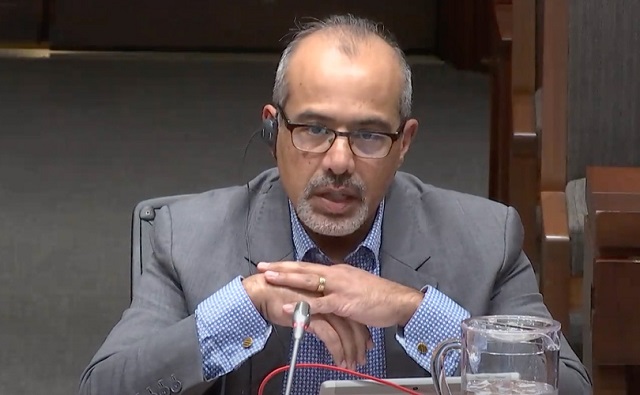MAiD
MAiD advocate speaks out against expansion of euthanasia to the mentally ill

Professor Sonu Gaind
From LifeSiteNews
By and
‘not so much a slippery slope as a runaway train.’
A leading Canadian psychiatrist has testified that Canada is “not ready” to offer euthanasia to the mentally ill.
Doctor K. Sonu Gaind, who supports euthanasia under certain circumstances, testified on November 28 before the Special Joint Committee on Medical Assistance in Dying (MAiD) in Ottawa against expanding the practice.
“This expansion is not so much a slippery slope as a runaway train,” he declared.
Gaind underscored that he is not a “conscientious objector” to euthanasia and that he was the chair of his prior hospital’s MAiD team. His principal concern is to protect those with mental illness.
“MAiD is for irremediable medical conditions, ones that we can predict won’t improve,” he said.
“Worldwide evidence shows we cannot predict irremediability in cases of mental illness, meaning the primary safeguard underpinning MAiD is already bypassed,” he continued.
The leading psychiatrist added, “Scientific evidence shows we cannot distinguish suicidality caused by mental illness from motivations leading to psychiatric MAiD requests … .[There are] overlapping characteristics suggesting there may be no distinction to make.”
RELATED: Top Canadian psychiatrists urge gov’t to halt expansion of euthanasia to the mentally ill
Gaind directly addressed the claims of “discrimination” made by those in support of the expansion of MAiD, including Senator Stanley Kutcher and Dr. Mona Gupta.
“MAiD assessors will be wrong over half the time when predicting irremediability, will wrongly believe they are filtering out suicidality, and will instead provide death to marginalized suicidal Canadians who could have improved,” he said.
“That is the ultimate discrimination.”
Gaind also took issue with statements made by Dr. Jocelyn Downie, a leading euthanasia activist and Trudeau Foundation Fellow.
“Professor Downie claimed, ‘Irremediability is a legal term rather than a clinical concept.’ Try those mental gymnastics on your constituents,” Gaind said dryly.
“Convince them it was okay their loved ones with mental illness got MAiD, not because of a clinical assessment based in medicine or science, but on the ethics of the particular assessor.”
Gaind criticized the euthanasia curriculum used by the Canadian Association of MAiD Assessors and Providers (CAMAP) for not teaching users how to differentiate between “suicidality” and “psychiatric MAiD requests.”
“A key problem with psychiatric MAiD assessments [is] the hubris of the assessor thinking they can determine irremediability and distinguish suicidality from psychiatric MAiD requests, when evidence shows they can do neither,” he said.
Based on all the evidence, Gaind is convinced that direct euthanasia should not be offered to the mentally ill.
“I’ve reviewed our legislation, the Health Canada practice standard, and the CAMAP training for MAiD for mental illness,” he said. “As someone who supports MAiD in general, I assure you: we are not ready.”
Gaind included in his fast-paced, passionate speech an admonishment of those who support expansion of MAiD.
“An echo chamber has driven expansion with reassurances but no safeguards,” he asserted. “It’s reassurance theatre.”
Gaind is a University of Toronto governor and professor of psychiatric medicine. In addition, he is Chief of the Department of Psychiatry at Toronto’s Sunnybrook Health Sciences Centre and past president of Canadian Psychiatric Association.
Former Bill C-7, which allows for euthanasia on the grounds of mental illness, was passed into law in early 2021. However, the eligibility of the mentally ill to be killed was delayed for two years. The exclusion was extended in February 2023 and then extended again in March to last until March 17, 2024.
In October this year, Conservative MP Ed Fast introduced Bill C-314, an effort to “amend the Criminal Code to provide that a mental disorder is not a grievous and irremediable medical condition for which a person could receive medical assistance in dying.”
When put to a vote, the Bill was defeated 167 to 150.
2025 Federal Election
Euthanasia is out of control in Canada, but nobody is talking about it on the campaign trail

From LifeSiteNews
While refraining from campaigning on the issue, Poilievre, to his credit, has said previously that he will ‘scrap’ the Liberal’s plan of expanding euthanasia to the mentally ill ‘entirely.’
Canada’s euthanasia regime should be one of the key election issues on the campaign trail, but thus far, there seems to be little interest in discussing the issue.
This despite the fact that last month, the United Nations Committee on the Rights of Persons with Disabilities took the stunning step of publishing a report calling on Canada to halt “Track 2 MAID,” stop the planned 2027 expansion of euthanasia to those suffering solely from mental illness, and reject “advance directives” for euthanasia.
Track 2 MAID was legalized in Canada in 2021, when a lower Quebec court ruled that restricting euthanasia to those with “reasonably foreseeable death” was unconstitutional and expanding eligibility to a wide range of Canadians suffering from various conditions. The floodgates opened; over 60,000 Canadians have died by euthanasia since legalization.
In fact, the vice-chair of the UN committee, at a hearing in Geneva, went so far as to ask a Canadian government representative how it was possible not to view Canada’s euthanasia regime as a “step back into state-sponsored eugenics.”
When Conservative leader Pierre Poilievre was asked on the campaign trail if his government would make any changes to Canada’s laws, he responded: “People will continue to have the right to make that choice, the choice for themselves. We are not proposing to expand medical assistance in dying beyond the existing parameters. That said, we also believe that we need better healthcare so that people have all sorts of options.”
Poilievre then pivoted to discussing his policies to fix Canada’s broken healthcare system, making it quite clear that this is an issue that he is not eager to discuss—likely because of high support for euthanasia in Quebec. Indeed, Dying with Dignity—Canada’s relentless and well-funded euthanasia lobby—has been releasing polling data designed to discourage politicians from addressing the issue, emphasizing public support for their agenda.
Rebecca Vachon of Cardus has a good breakdown of DWD’s data that highlights the truth of the old political adage that polls are often commissioned to shape public opinion rather than measure it:
Poilievre, to his credit, has previously made his position on euthanasia for mental illness crystal clear, voting for a Conservative bill to ban the practice and stating in February that, if elected, “We will revoke an expansion entirely.” Mark Carney, on the other hand, has made no statement on euthanasia whatsoever, which indicates that he is likely to carry on the Trudeau government’s policies, which are still in effect—including the planned 2027 expansion of euthanasia to those suffering solely from mental illness.
Indeed, in response to a request for comment on the United Nations Committee on the Rights of Persons with Disabilities report and recommendations from Canadian Affairs, Health Canada ignored the condemnation of Canada’s regime and instead simply reiterated the current framework—including the planned 2027 eligibility expansion. In summary, if the Liberals are re-elected at the end of this month, it is full steam ahead—and Canadians with disabilities will simply have to live (or die) with it.
Despite the Conservative Party’s clear disinterest in campaigning on the issue, the choice before Canadians is still clear. Make no mistake: Expanding euthanasia to those with mental illness would be one of the greatest national tragedies since the 1988 R v. Morgentaler decision. If you have found the stories of the past several years horrifying, remember: They are nothing compared to the stories that we will all be forced to read, and perhaps even experience, once a Liberal government begins to facilitate suicide for those suffering solely from suicidal ideation.
MAiD
Disability rights panel calls out Canada, US states pushing euthanasia on sick patients

From LifeSiteNews
Physician-assisted suicide programs in the US and Canada are discriminating against patients with serious medical conditions according to a panel discussion at the Religion News Association.
Physician-assisted suicide programs in the United States and Canada are discriminating against patients with serious medical conditions even when their cases are not terminal, in many cases pushing to end their lives for financial reasons rather than medical.
Catholic News Agency reported that a panel of disability-rights advocates recently examined the landscape of the issue during the Religion News Association’s 2025 annual conference. During the panel, Patients Rights Action Fund (PRAF) executive director Matt Vallière accused state euthanasia programs of discriminating against patients with life-threatening conditions in violation of the Americans with Disabilities Act, noting that when a state will “will pay for every instance of assisted suicide” but not palliative care, “I don’t call that autonomy, I call that eugenics.”
Inclusion Canada CEO Krista Carr, meanwhile, discussed her organization’s lawsuit against the expansion of Canada’s medical assistance in dying (MAID) program to “people with an incurable disease or disability who are not dying, so they’re not at end of life and their death is not reasonably foreseeable.”
More astonishingly, she added, this “funded right” to lethal injection is slated to be expanded to mental illness in 2027.
“By setting out a timeline of three years, it’s an indication that the systems need to move towards readiness in two years. There’s the opportunity to do another review, and to assess the readiness of the system through a parliamentary process,” Health Minister Mark Holland said in February of the move, which Dying with Dignity Canada presents as a matter of “equality” for “those whose sole underlying condition is a mental illness.”
“It’s being called a choice,” but “it’s not a choice,” Carr said. Rather, these programs are pushing the “choice” on patients in “a desperate situation where they can’t get the support they need.”
As LifeSiteNews recently covered, the “most recent reports show that (medical assistance in dying) is the sixth highest cause of death in Canada. However, it was not listed as such in Statistics Canada’s top 10 leading causes of death from 2019 to 2022.”
In America, nine states plus the District of Columbia currently allow assisted suicide.
Support is available to talk those struggling with suicidal thoughts out of ending their lives. The American Suicide & Crisis Lifeline and the Canadian Suicide Crisis Helpline can both be reached by calling or texting 988.
-

 espionage2 days ago
espionage2 days agoEx-NYPD Cop Jailed in Beijing’s Transnational Repatriation Plot, Canada Remains Soft Target
-

 2025 Federal Election2 days ago
2025 Federal Election2 days agoCanada drops retaliatory tariffs on automakers, pauses other tariffs
-

 2025 Federal Election2 days ago
2025 Federal Election2 days agoBREAKING from THE BUREAU: Pro-Beijing Group That Pushed Erin O’Toole’s Exit Warns Chinese Canadians to “Vote Carefully”
-

 Daily Caller2 days ago
Daily Caller2 days agoTrump Executive Orders ensure ‘Beautiful Clean’ Affordable Coal will continue to bolster US energy grid
-

 Daily Caller2 days ago
Daily Caller2 days agoDOJ Releases Dossier Of Deported Maryland Man’s Alleged MS-13 Gang Ties
-

 2025 Federal Election1 day ago
2025 Federal Election1 day agoAllegations of ethical misconduct by the Prime Minister and Government of Canada during the current federal election campaign
-

 John Stossel1 day ago
John Stossel1 day agoClimate Change Myths Part 1: Polar Bears, Arctic Ice, and Food Shortages
-

 Business2 days ago
Business2 days agoChina, Mexico, Canada Flagged in $1.4 Billion Fentanyl Trade by U.S. Financial Watchdog









